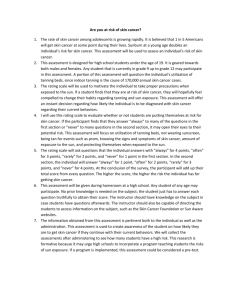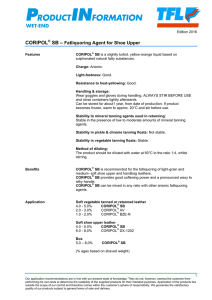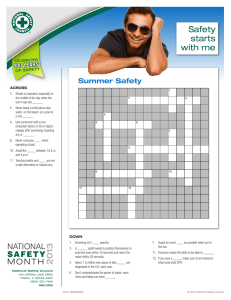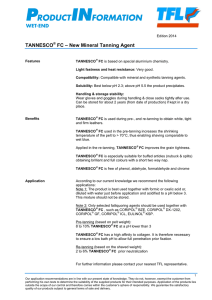A Study of Tanning Operators in the State of Kansas:
advertisement
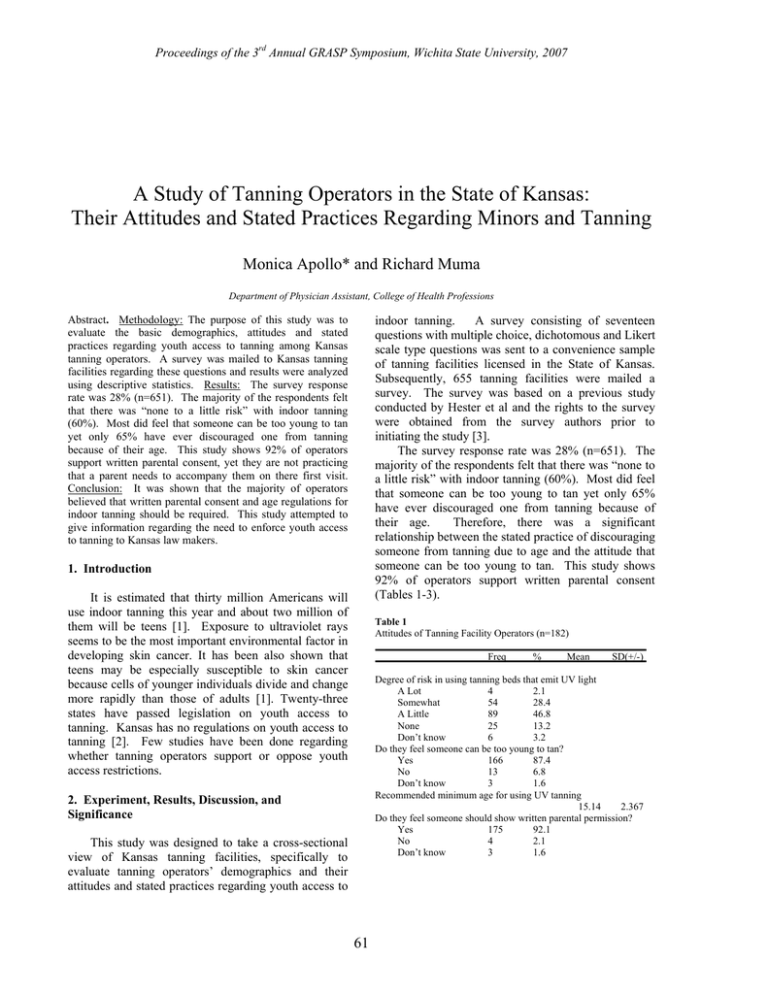
Proceedings of the 3rd Annual GRASP Symposium, Wichita State University, 2007 A Study of Tanning Operators in the State of Kansas: Their Attitudes and Stated Practices Regarding Minors and Tanning Monica Apollo* and Richard Muma Department of Physician Assistant, College of Health Professions Abstract. Methodology: The purpose of this study was to evaluate the basic demographics, attitudes and stated practices regarding youth access to tanning among Kansas tanning operators. A survey was mailed to Kansas tanning facilities regarding these questions and results were analyzed using descriptive statistics. Results: The survey response rate was 28% (n=651). The majority of the respondents felt that there was “none to a little risk” with indoor tanning (60%). Most did feel that someone can be too young to tan yet only 65% have ever discouraged one from tanning because of their age. This study shows 92% of operators support written parental consent, yet they are not practicing that a parent needs to accompany them on there first visit. Conclusion: It was shown that the majority of operators believed that written parental consent and age regulations for indoor tanning should be required. This study attempted to give information regarding the need to enforce youth access to tanning to Kansas law makers. indoor tanning. A survey consisting of seventeen questions with multiple choice, dichotomous and Likert scale type questions was sent to a convenience sample of tanning facilities licensed in the State of Kansas. Subsequently, 655 tanning facilities were mailed a survey. The survey was based on a previous study conducted by Hester et al and the rights to the survey were obtained from the survey authors prior to initiating the study [3]. The survey response rate was 28% (n=651). The majority of the respondents felt that there was “none to a little risk” with indoor tanning (60%). Most did feel that someone can be too young to tan yet only 65% have ever discouraged one from tanning because of their age. Therefore, there was a significant relationship between the stated practice of discouraging someone from tanning due to age and the attitude that someone can be too young to tan. This study shows 92% of operators support written parental consent (Tables 1-3). 1. Introduction It is estimated that thirty million Americans will use indoor tanning this year and about two million of them will be teens [1]. Exposure to ultraviolet rays seems to be the most important environmental factor in developing skin cancer. It has been also shown that teens may be especially susceptible to skin cancer because cells of younger individuals divide and change more rapidly than those of adults [1]. Twenty-three states have passed legislation on youth access to tanning. Kansas has no regulations on youth access to tanning [2]. Few studies have been done regarding whether tanning operators support or oppose youth access restrictions. Table 1 Attitudes of Tanning Facility Operators (n=182) Freq % Mean SD(+/-) Degree of risk in using tanning beds that emit UV light A Lot 4 2.1 Somewhat 54 28.4 A Little 89 46.8 None 25 13.2 Don’t know 6 3.2 Do they feel someone can be too young to tan? Yes 166 87.4 No 13 6.8 Don’t know 3 1.6 Recommended minimum age for using UV tanning 15.14 2.367 Do they feel someone should show written parental permission? Yes 175 92.1 No 4 2.1 Don’t know 3 1.6 2. Experiment, Results, Discussion, and Significance This study was designed to take a cross-sectional view of Kansas tanning facilities, specifically to evaluate tanning operators’ demographics and their attitudes and stated practices regarding youth access to 61 Proceedings of the 3rd Annual GRASP Symposium, Wichita State University, 2007 Table 2 Stated Practices of Tanning Facility Operators (n=182) Freq % Mean 3. Conclusion SD(+/-) The youth population needs to be aware of the associated risks and increased correlation of skin cancers with indoor UV tanning. By surveying a selected group of tanning facility operators in Kansas; this study provided insight into their perceptions regarding youth access to tanning. It was shown that the majority of operators believed that written parental consent and age regulations for indoor tanning should be required. Furthermore, this study showed tanning facility operators’ attitudes and stated practices regarding youth access to tanning in Kansas. In the end, this study may be helpful to legislators in regards to knowledge about whether tanning operators’ support or oppose tanning regulations. Discouraged someone from tanning for being too young Yes 124 65.3 No 55 28.9 Don’t know 3 1.6 Age at which adults are no longer required to accompany children 16.31 1.433 Age of youngest customer 16.89 4.061 Must children under certain age be accompanied by an adult when receiving tanning treatments Yes 109 57.4 No 67 35.3 Don’t know 4 2.1 Age that parental permission must be obtained 16.55 1.564 Table 3 Analysis of Attitudes and Stated Practices 4. Acknowledgements We would like to thank Dr. Robert Dellavalle for his permission to use his survey for this research project. Discouraged someone from tanning for being too young Yes Do they feel someone can be too young to tan? Yes 115 No 2 117 No Total X2 42 11 53 157 13 170 18.735* [1] Skin Cancer Foundation. Available at: http://www.skincancer.org/skincancer-facts.php. Accessed November 20. [2]Francis SO, Burkhardt DL, Dellavalle RP. 2005: A banner year for new US youth access tanning restrictions. Arch Dermatol. Apr 2005;141(4):524-525. [3] Hester EJ, Johnson KR, Crane LA, Schilling LM, Dellavalle RP. Indoor UV tanning operator opinion regarding youth access: an electronic survey. J Am Acad Dermatol. Nov 2004;51(5):814-816. Must children under certain age be accompanied by an adult when receiving tanning treatments Do they feel someone should show written parental permission? Yes No Yes No Total 98 2 100 64 2 66 162 4 166 Pearson Correlation Mean X2 2.361 SD(+/-) Recommended minimum age for using UV tanning & age of youngest customer. Correlation =.267† Minimum age Youngest customer 15.14 16.89 2.367 4.061 *df=1, P<.0001 †P<.0001 62

